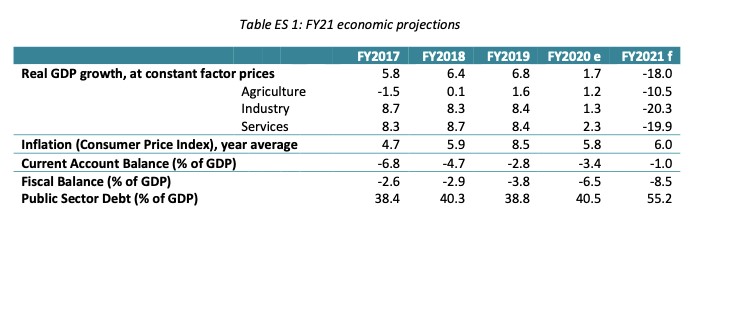Myanmar’s economy is set to shrink by 18 percent this fiscal year amid the ongoing political upheaval caused by the military coup and a rapid surge in the third wave of COVID-19 in the country, the World Bank said in its latest report.
The World Bank said the 18 percent contraction in fiscal year 2021 (October 2020-September 2021), coming on top of weak growth in FY2020, “would mean that the country’s economy is around 30 percent smaller than” it would have been in the absence of the pandemic and the military takeover on Feb. 1
In March, the global financial institution forecast that the country’s economy was expected to contract by 10 percent this year as military rule hammered what was one of the region’s fastest-growing economies. However, nearly six months after the military grabbed power, its forecast has changed, with the economy expected to shrink by 18 percent as the country’s political and heath crises have deepened and the prospect of civil war looms.
“Around 1 million jobs could be lost, and many other workers will experience a decline in their incomes due to reduced hours or wages,” the bank said. The share of Myanmar’s population living in poverty is likely to more than double by the beginning of 2022, compared to levels before COVID-19 hit, the bank said.
Myanmar, a least developed country, has made significant achievements in poverty reduction over the last decade. In 2017, Myanmar had a poverty rate of 24.8 percent, down from 48.2 percent in 2005, according to the United Nations.
“The loss of jobs and income and heightened health and food security risks are compounding the welfare challenges faced by the poorest and most vulnerable, including those that were already hit hardest by the pandemic last year,” said Mariam Sherman, World Bank country director for Myanmar, Cambodia and Laos.
“The military takeover in February immediately impacted an economy that had already been weakened by COVID-19,” the World Bank said.
Since the military takeover, major multi-billion-dollar foreign investment projects have halted and existing operations are being shelved. As a result, millions of people have lost their jobs and are facing food shortages.
According to the bank, domestic activity and trade have been hit by reduced mobility; protests, security concerns and worker strikes; and the ongoing disruption of critical business services including banking, logistics and telecommunications.
Despite bank branch reopenings and several interventions by the Central Bank of Myanmar, physical currency continues to be in short supply and access to banking and payment services remains limited, the bank said.

The bank’s report said that as of mid-July, the Myanmar kyat had depreciated by around 23 percent against the US dollar since late January, which combined with trade disruptions has led to rapid price increases for some imported products, including fuel. Moreover, farmers have been affected by lower wholesale prices for some crops, higher input prices and limited access to credit, the bank said.
“Taken together, these shocks have weakened consumption, investment and trade, and disrupted businesses’ operations and the supply of labor and inputs,” the bank said.
The current third wave of COVID-19 is posing an immediate threat to lives, livelihoods and the economy, especially given the lack of capacity in the public health system to adequately respond, the World Bank warned.
While testing rates remain limited, extremely high positivity rates among those who have been tested indicate widespread community transmission. Combined with the impact of containment measures and precautionary behavior, this will amplify Myanmar’s economic challenges, the bank said.
“Over the longer term, recent events have the potential to jeopardize much of the development progress that has been made over the past decade. Significant impacts on investment, human capital accumulation and the environment for doing business are likely to impair prospects for economic growth over the longer term,” it said.
You may also like these stories:
Myanmar’s Third Wave COVID-19 Deaths Now Exceed Fatalities in First and Second Waves
Thai Govt Must Take Responsibility for Vaccine Debacle
Chinese Casino City in Myanmar Recruiting Despite COVID-19 Crisis

















